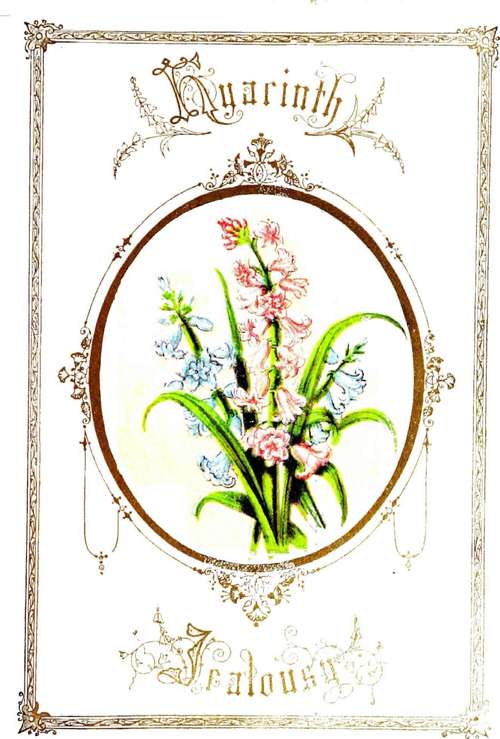The Hyacinth
Description
This section is from the book "Garden Flowers". Also available from Amazon: Garden Flowers (1857 ).
The Hyacinth
This sweet flower is emblematical of "games and play." From its tapering bulb long green leaves shoot up, in the centre of which is a stalk on which the bloom, in the form of bells, grows all round, causing it to droop. Blue, red, and white are the most ordinary colours, and there are several varieties. In the British islands the Hyacinth is among the earliest blossoming plants in spring.
Ancient mythological poets seem to revel in the realms of Flora, and few indeed are the romantic strains of old that do not deal largely with flowers, attaching to their names meanings and significations that have become familiar to our ears as "household words." The Hyacinth is not neglected, and it has been celebrated in song from the time of Homer to the present day. It has been chosen to symbolize play in consequence of its fabulous origin. According to mythologists, it is said to have sprung from the blood of Hyacinth us, a youth who was killed by a quoit through the agency of Zephyr, who blew it out of its course as it passed from the hand of Apollo, and smote the unfortunate youth to the ground.
The best kind of Hyacinth has double flowers, with brilliant colours. It is a favourite with the Dutch, who have brought it to great perfection. In England it will endure the winter in the ground, but in Holland the bulbs are lifted and carefully stored during winter.
An unknown poet sings of this flower in the following strains
*k Oh! mournful, graceful, sapphire-coloured flower, That keep'st thine eye for ever fixed on earth: Gentle and sad, a foe thou seem'st to mirth— What secret sorrow makes thee thus to lower?
"Perhaps 'tis that thy place thou canst not change, And thou art pining at thy prison'd lot; But oh where could'st thou find a sweeter spot. Wert thou permitted earth's wide bounds to range?
" In pensive grove, meet temple for thy form. Where, with her silver music, dotli intrude The lucid stream, where nought unkind or rude Durst break of harmony the hallow'd charm;
" rhy beauties, all unseen by vulgar eyes,
So, in his brightness, still delights to view; He clothes thy petals in his glorious hue, To show how much of old he did thee prize."

Continue to:
